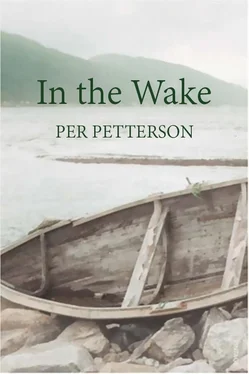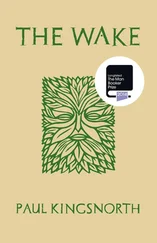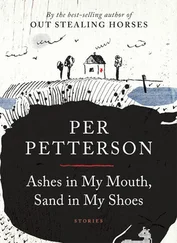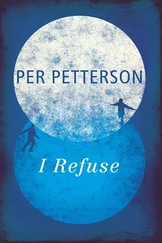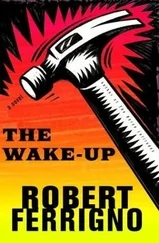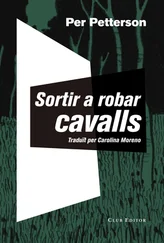“You’re awake early,” I said.
He nodded.
“I am going away now,” I said, “to England. I shall be away for quite a long time.”
“I know,” he said, and then he was quiet, and then he said:
“Is it true that the Beatles aren’t together any more?”
“I’m afraid it is.”
“You won’t meet them, then.”
He had heard that music since the cradle. It had always been there, on the radio and the record player, and now it was over, and that took a long time to sink in.
“Maybe I shall meet them separately. If I see Paul McCartney I will send him your love,” I said, and then he smiled. We had discussed it several times; he liked McCartney best, and I liked John Lennon, but I felt generous that morning and several good songs came to mind that McCartney had written.
“That’s great.” He stood up and said: “Have a good time, then,” and shook my hand in a solemn manner.
“You have a good time too,” I said, and gave his hand a little squeeze, and he went up to bed again, and I took the tube into Oslo and walked along past Østbanestasjonen and the railway line to Mosseveien, and there I took my place by a petrol station with my thumb out. There had been rain in the night, but now the sun was bright and there was a sharpness in the air that felt good and a sparkle on the fjord that I knew so well, but it had already turned into something different, and the town behind me seemed changed, and the Ekeberg ridge and the merchant navy college like a fortress up there, and the pale blue tram on its way to the top had also changed.
I was wearing the old pea jacket I thought was like the one Martin Eden wore when he went ashore at San Francisco in Jack London’s best novel and was about to haul himself up by the hair into a new life of knowledge. That was what I wanted too. The jacket must have been ten years old, and I had bought it from the Salvation Army, and even if I could not remember if Martin Eden really had a pea jacket in the book, he should have done, and I was fond of that jacket, I had used it almost every day for more than a year. I had pinned an FNL badge to the collar, and in my backpack I had a warm sleeping bag and a watertight notecase and three books to keep me linked to the world; Bobby Seale’s Seize the Time , about the Black Panthers; Svend Lindqvist’s The Myth of Wu Tao-tzu , the one that ends with the question: Is social and economic liberation possible without violence? No. Is it possible with violence? No. And I had Paal-Helge Haugen’s Leaves from an Eastern Garden: 100 Haiku . They were good to read early in the morning.
I was leaving my childhood behind and my father and all he stood for and all he was not, and it had taken its time, but I felt fearless now standing at the edge of the road and free to choose my own life, full of love for the future, and only fifteen minutes later a trailer truck came panting out by Loenga and stopped a little way further along the road. The driver softly sounded his horn as a signal to me to join him.
Now I was walking in a Swedish night, with an all-Norwegian pack on my back on my way through a town where the sea air blew in quite differently from the fjord at home, and the houses were not unlike those I was used to seeing, but still somehow different; somewhat higher and somewhat more beautiful, and all crafted with some other stone containing some other glow that I did not know, and canals traversed the town reflecting the street lights, and they were yellow and orange and almost red in the oily water, and there was music from an open window. It was something from an opera, and I had never liked opera, but I did like opera now, and I remember singing, but I do not remember which song.
The truck driver was right. It was a long way. I had to walk right through the town in a semicircle around the harbour area and past the shipyards that had not yet closed down, and on northwards almost right out to Torslanda airport and the Volvo factory, and I walked and walked, and when I got there the night was far advanced and there were no street lamps, only one or two chance lights and some lamps by the ferry quay where I could feel the sea like a sigh, but I could not see it.
There was an oil refinery there with BP painted in yellow and green on the great shiny tanks and a tower where a gas flame crackled and burned at the top and threw enough light for me to find my way up between two big rocks. I decided it would not rain that night and unpacked my sleeping bag and spread it straight on to the ground and crept into it with all my clothes on. I was exhausted and happy and fell asleep at once, and the few times I woke I looked straight up at the sky with its multitude of stars, and I knew the names of the biggest ones, and I saw the gas flame shining and heard it crackling and felt at home in the world.
What finally woke me was the sound of steps and the sound of bicycle wheels and the squeaking sound of pedals on chain guards and a bus stopping and opening its doors. I heard voices and someone laughing, and I sat up in my sleeping bag, rubbed my eyes and peered over the top of the rough grey knoll in front of me. Everything was completely clear. I saw the sea straight out and bare sloping rocks and low islands in the light of a low sun, and at the quay lay a large boat with the name M/s Spero painted on its side. The British ensign aft waved gently in the light wind, and it was a warm morning for September. Between the rise where I was lying and the quay there was a road which was the same one I came along last night, and now a stream of people in blue were making their way from the south part of town to where the Volvo factory was situated with its great gates and its logo in a circle above them. It was clear to see at the end of the road. One man turned and looked at my head sticking up, and even at a distance he was obviously smiling, and then I raised my hand and waved, and he waved back, and then several men turned, perhaps ten or twenty of them, and they all smiled and raised their hands and waved.
By the time the ferry had sailed I had read two haiku by Basho about the vast night falling on a road where nobody walks, and packed the book tidily in my rucksack again.
The sea was quiet and calm off the coast of Sweden and a little boring across the Kattegat until we rounded the completely flat tip of Denmark at Skagen, and then we were in the North Sea with a wind sweeping the deck, and the boat rolling as it was meant to roll, and at breakfast time the cups flew off the table and hit the floor with a loud clatter, and some of them broke, and no-one managed to get a mouthful in before the third try. Later on, there was a smell of dinner in the corridors, and not many people felt up to that, but I did, as I had known I would. I sat in the saloon reading for hours, and felt the boat lifting me up and letting me fly between sea and sky before dropping me down, and it had no effect on me at all. I stood a long time out on deck with a firm grip on the rail, staring into the lashing grey and heard the wind howling in masts and cables, then I went inside with salt water in my hair, to the cafeteria where I sat down to talk with young Americans on their way through Europe to see a bit of the world just once before settling down, but they felt sick now and looked it too, and I laughed and said: “This is nothing.”
I showed them the FNL badge and told them that the peasants with their round pointed hats and wide trousers would tear them to pieces in the end. I held out the Bobby Seale book so they could see the gloved fist on the cover, and I explained how the Black Panthers’ fight with the American government was more than ripe and completely justified, and they looked at me with seasick eyes as if I had taken leave of my senses. But I had never felt more sensible, I was mental health personified, and I am sure I was laughing the whole voyage through, for I knew that when the boat finally reached its destination and glided quietly up the long Humber with its docks and fishing boats, past Grimsby on the way in to Hull where it would stop and moor up, then my brother would be on the quay waiting to share all that was his with me.
Читать дальше
